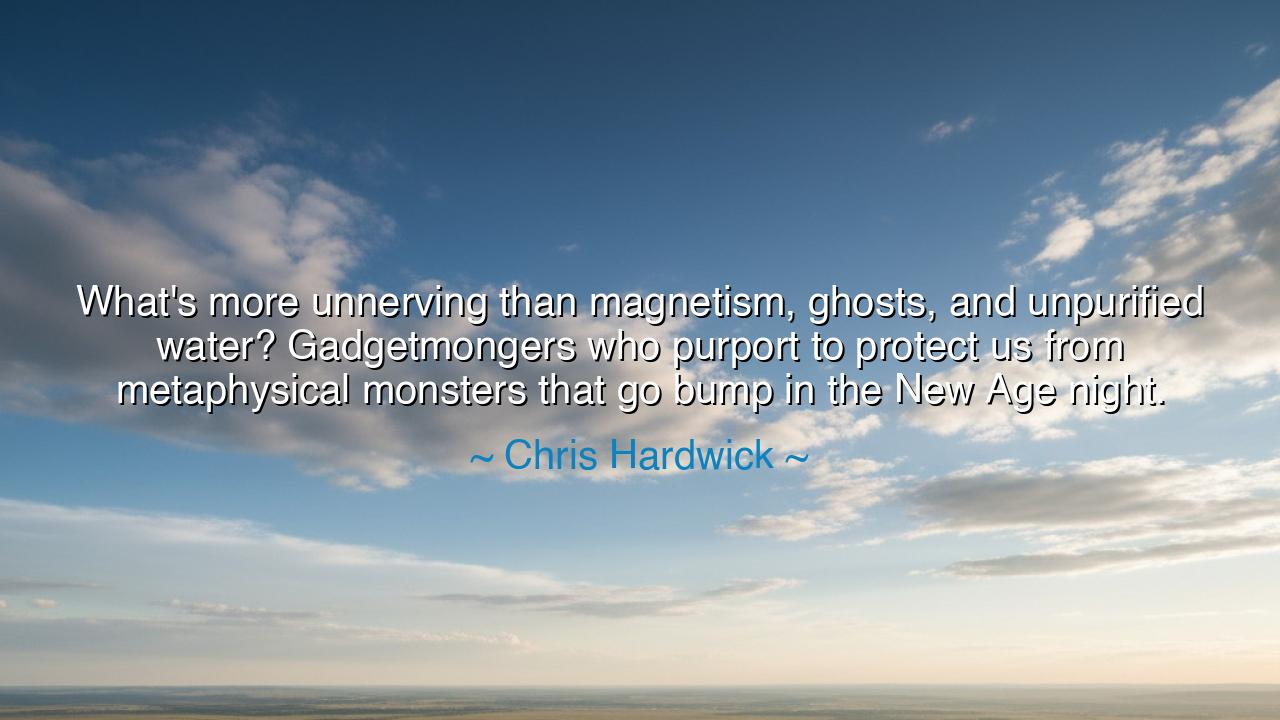
What's more unnerving than magnetism, ghosts, and unpurified
What's more unnerving than magnetism, ghosts, and unpurified water? Gadgetmongers who purport to protect us from metaphysical monsters that go bump in the New Age night.






In the depths of human history, there has always been an innate fear of the unknown—of forces that exist beyond our understanding, forces that pull at the fabric of reality itself. We have feared the unseen, from the strange magnetism that tugs at our compasses, to the whispered tales of ghosts that haunt the night, and even the mysterious forces of unpurified water that may carry disease or death. Yet, in these times, when the world has grown more complex, when our technologies and our devices advance with breathless speed, there is something far more unnerving that lurks in the shadows: gadgetmongers—those who claim to protect us from these ancient fears using their inventions and promises. Chris Hardwick—in his sharp-witted way—points to this modern phenomenon when he says, “What's more unnerving than magnetism, ghosts, and unpurified water? Gadgetmongers who purport to protect us from metaphysical monsters that go bump in the New Age night.”
What, then, do gadgetmongers represent in this age of technological marvels? They are those who, with the gleam of their shiny machines and gadgets, promise salvation from the very forces that have long eluded mankind’s grasp. They offer devices and solutions, sold with the allure of protection and security, claiming to defend us from ghosts, from unseen forces, from metaphysical monsters that may haunt our spirits. But in doing so, they take on the role of false prophets, offering fake solutions to the unknown, seeking to profit from our fears. And thus, Hardwick's words become a warning—that sometimes the greatest menace is not the unseen force, but the charlatans who profit from our fear of it.
We need not look far into the past to see the rise of such gadgetmongers. In the Victorian age, during the time when society was awash in the fever of spiritualism, men and women gathered in dark rooms to commune with spirits through devices like the planchette and the Ouija board. Some of the greatest minds of the day were drawn to these new forms of contacting the afterlife, even as scientists and philosophers warned that this was nothing more than a trick—a tool for the deceitful and the unscrupulous. Yet, despite the warnings, the fear of the unknown led many to embrace the mysticism of the time, paying handsomely for false answers to eternal questions. The ghosts and unseen forces that terrified them were easily supplanted by the belief in these devices, a belief that Hardwick might see as a precursor to the modern gadgets of today.
Similarly, in our own time, there are those who claim to sell protection from metaphysical monsters—be they spiritual, emotional, or even technological in nature. Think of the proliferation of devices that promise to shield us from the dangers of our modern world: anti-radiation shields, magnetic therapy devices, or even the infamous pendants and amulets marketed as guardians against unseen forces. These gadgetmongers tap into our deepest insecurities, offering us the illusion of safety in exchange for our faith and our money, feeding off our desire for control over the uncontrollable.
The danger in all of this, as Hardwick so poignantly points out, is that the real monster is not the metaphysical threat we so fear, but the con artists who prey on these fears. They provide no real answers, no genuine protection. Their promises are like the false lights in the dark—shining brightly but leading us further into the shadows. They offer nothing but empty solace, a temporary distraction from the deep and uncomfortable truth that we are, all of us, vulnerable to the vast mysteries of the universe. The true power lies not in the gadgets, but in our own ability to face the unknown with courage and wisdom.
Consider, for example, the ancient wisdom of Socrates, who sought not to protect his followers from the unknown but to embrace it with inquiry and reason. Socrates did not fear the darkness, nor did he cower from the metaphysical monsters of his time. Instead, he questioned, he searched for truth through philosophy, believing that true protection came not from external devices, but from the strength of the mind and the soul. The great thinkers of history have always known that true power lies in understanding, in the cultivation of inner strength rather than reliance on external sources that promise safety without substance.
Thus, Hardwick's warning is a call for us to seek the truth, to face the unknown not with blind faith in gadgets and devices, but with the knowledge and wisdom passed down through the ages. The monsters of the New Age are not the spirits of the dead, nor the magnetic forces that swirl around us, but the false promises made by those who prey on our deepest fears. Let us not be so easily deceived. Instead, let us stand firm in the understanding that true safety lies in the strength of our own minds and the power of reason. Only then will we face the night with courage, without the need for false protections, and find the true peace that comes from embracing the mystery of the unknown.






AAdministratorAdministrator
Welcome, honored guests. Please leave a comment, we will respond soon